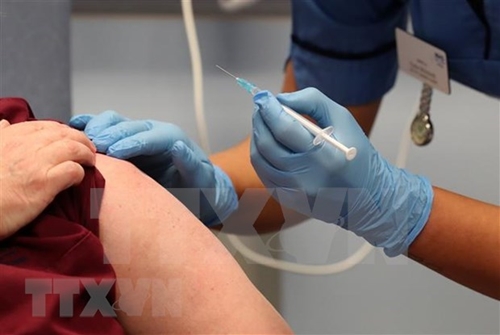ADB President Masatsugu Asakawa said as ADB’s developing members prepare to vaccinate their people as soon as possible, they need financing to procure vaccines as well as appropriate plans and knowledge to be able to safely, equitably, and efficiently manage the vaccination process.
“APVAX will play a critical role in helping our developing members meet these challenges, overcome the pandemic, and focus on economic recovery,” he said.
    |
 |
|
A person gets COVID-19 vaccine injection |
It provides a comprehensive framework and resource envelope for supporting developing Asia’s vaccine access, using two complementary components. The Rapid Response Component will provide timely support for critical vaccine diagnostics, procurement of vaccines, and transporting vaccines from the place of purchase to ADB’s developing members, he added.
According to Masatsugu Asakawa, ADB financing for vaccines will be provided in close coordination with other development partners including the World Bank Group, World Health Organization (WHO), COVID-19 Vaccines Global Access Facility (COVAX), GAVI, and bilateral and multilateral partners.
ADB is also making available a USD 500 million Vaccine Import Facility to support the efforts of its developing members to secure safe and effective vaccines, as well as the goods that support distribution and inoculation.
In April, ADB approved a USD 20 billion package to support its developing members in addressing the impacts of the pandemic and streamlined some procedures to deliver quicker and more flexible assistance. ADB has committed USD 14.9 billion in loans, grants, and technical assistance, including USD 9.9 billion in quick-disbursing budget support from the COVID-19 Pandemic Response Option (CPRO) and support for the private sector.
In November, ADB announced USD 20.3 million in additional technical assistance to establish systems to enable efficient and equitable distribution of vaccines across Asia and the Pacific.
More than 14.3 million positive cases have been identified in Asia and the Pacific, causing more than 200,000 deaths. As the pandemic persists, economic growth in developing Asia is projected to contract by 0.4 percent in 2020 - the first regional gross domestic product contraction since the early 1960s.
Source: VNA